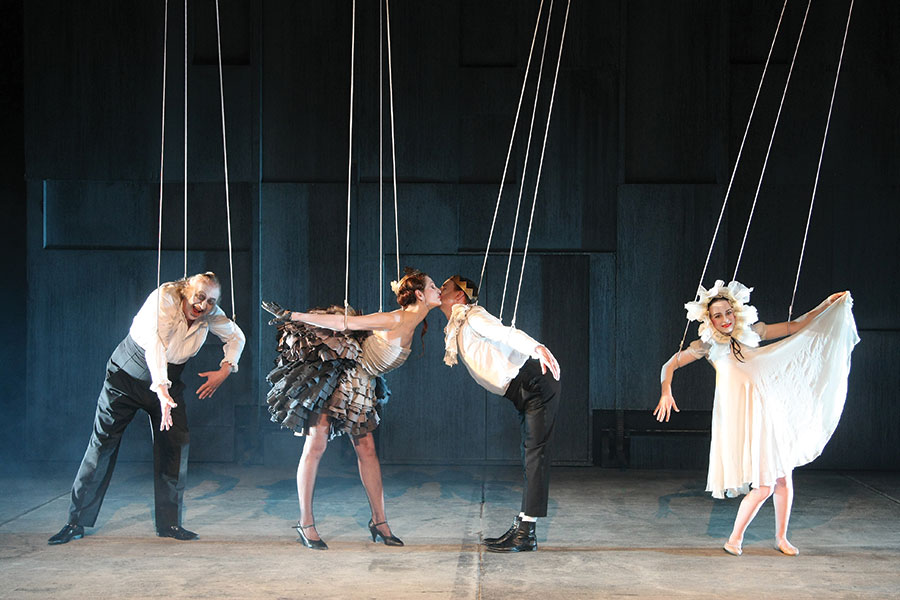Happy New Year! January is a time for new beginnings. It’s a time for bidding farewell to the joys and the heartbreaks of the 12 months gone by, while looking ahead to the new creative possibilities—and behavioral transformations—that so many of our resolutions aim to achieve.
This year’s annual turning point is a bit more complicated, as we inaugurate a new U.S. president while still processing the rancor, drama, and divisiveness of the 2016 election cycle. There’s a sense of discomfort on all sides of the still unresolved debate, and it’s nearly impossible to disengage. No matter what your political leanings or your role in our theatre community, concerns abound about threats to the increased social equality we’ve been striving for—and to the very democracy we work within.
This is the way we enter 2017, and it feels anything but peaceful. There’s a sense of foreboding about what’s to come. But rather than starting the year with another outspoken opinion (to augment the millions that have already been offered via blogs, newspaper articles, tweets, and other forums, including this column), I want to reflect on how to achieve some balance and increased effectiveness for the road ahead.
Here are a few thoughts on what I hope to do more of. And I look forward to hearing what others have in mind.
- More nature, less human nature (or more nurture): With January comes the noticeable, gradual lengthening of the days. The progression from winter into spring can remind us that, in addition to being hardworking theatre people, community members, parents, children, siblings, friends, lovers, and political beings, we are also earthlings—part of the nature that surrounds us. We sometimes lose that connection, and we can garner strength from re-establishing it and becoming one with it, by walking in the park, reviving a community garden, escaping to the woods, or taking in the sunrise. It’s a way to breathe and gain perspective, to tame the adrenalin overload that comes with feeling that, as humans, we must fix the world we’ve damaged, and do so by yesterday. We need that urgency to make progress, but it’s harder to be effective without some balance, some freedom from the frenzy—if you can find it.
- More in-person, less online-person: Early in 2016, when attending Bogotá, Colombia’s Iberoamerican Theatre Festival, I lost my phone. A sense of panic set in: How would I find my way without Google Maps? Then I recalled the times I’d been at the same festival, in the days prior to map apps, and had navigated the city perfectly well. With our devices, we’ve gained boatloads of connectivity, but we’ve also weakened some basic human skills along the way. We learn so much about people’s lives, loves, and points of view through our minute-by-minute online encounters. Sometimes too much. I wouldn’t give it up for anything, as these tools have connected us in ways that are potent, while offering access to news and ideas that we might not find through the traditional media channels. But I know the value of a few planned techno-free breaks as well. Can a group of friends and/or colleagues ditch the phones in favor of a conversation around a table? Can people who know each other only through social media plan an in-person meeting? While these protestations may seem obvious or even passé, I believe it’s an impulse that can at least partly help restore the civil civic dialogue that seems so scattered. Are theatres where people can gather across difference for dialogue about important community issues?
- More action, less reaction: Social media has given us a place to vent, to express opinions, to establish our political selves through shares and retweets, likes and loves, emoticons and chosen links. And it can feel at times like the post that garners hundreds of reactions equals a job well done. That that post is activism all by itself. Sometimes it is. Often it is not.
There’s been some important online organizing taking place around the Standing Rock sit-in in North Dakota, and we have Ty Defoe and Larissa FastHorse’s new organization Indigenous Direction to thank for some of that. In addition to ongoing background information and updates, their site offers specific suggestions for action, including knowing which banks are investing in the Dakota Access Pipeline.
So, depending on where you personally want to have impact, there are some small but essential ways to make positive change. What banks do you use, and where are they investing? What is your personal carbon footprint? Which organizations doing good work are you supporting through even modest contributions of time and/or money? How often do you respond to TCG/PAA action alerts to write your congresspeople or sign and circulate petitions? Do you seek out opinions that differ from your own and find ways of bridging divides?
The road ahead is paved with uncertainty and possibility, and we may all may be called upon to interact with our fellow Americans in new and different ways. Let’s be healthy and ready as we enter a new year and a new era.


